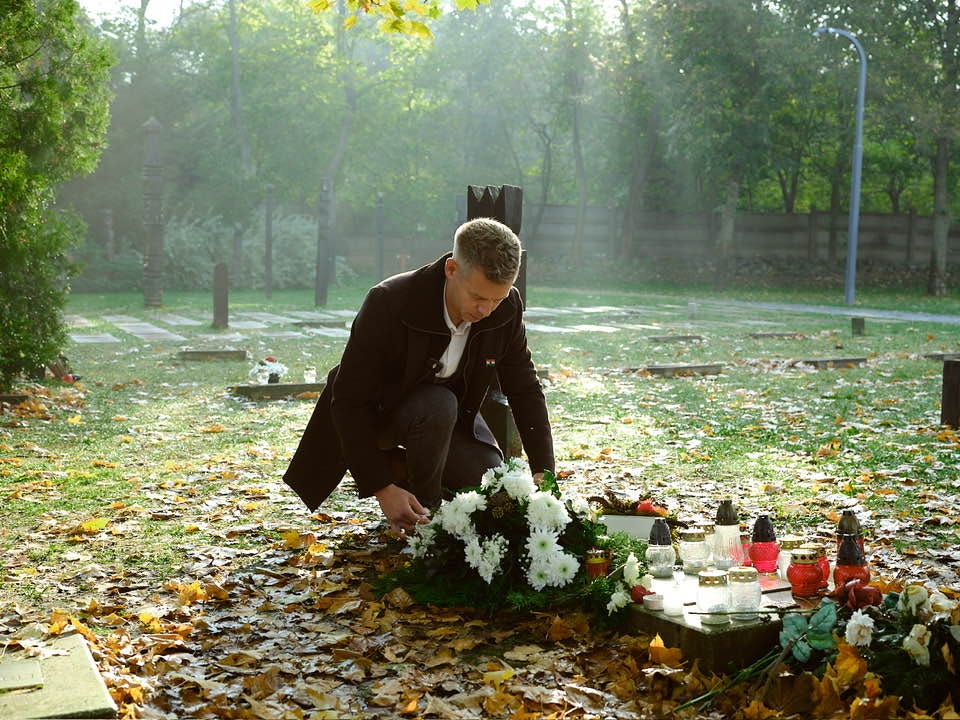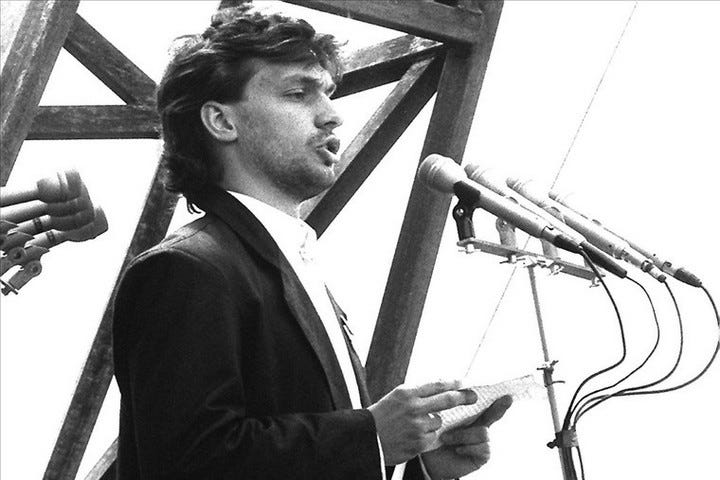Earlier this week, Idea, a Hungarian polling institute, conducted a poll showing that Péter Magyar and his Tisza party have a slight lead over Viktor Orbán and his Fidesz party. This marks the first time in 18 years that anyone has been more popular than Orbán and his party. While Orbán has previously faced midterm dips in popularity, he has never been in second place.
Péter Magyar’s speech on October 23rd, the memorial day of the 1956 revolution, was highly anticipated. A couple of weeks earlier, Balázs Orbán, the Political Director of the Fidesz party, made a serious blunder, and his party had paid dearly for it by boosting Magyar’s Tisza Party.
Orbán's overexcited Trump cheerleader committed political suicide
The political scene in Hungary is buzzzzzzing.
Magyar’s major events in Budapest are feature-length productions, and this one was no exception. Renowned Hungarian actors performed poems and songs about freedom before Magyar took the stage. He and his team understand that a significant portion of the audience travels for hours to attend his rallies, so they aim to ensure the experience lasts long enough.

His speech was professional. After all, he is a professional politician, isn’t he? He is, but we’ve come to expect subpar performances from the Hungarian opposition. Conversely, this speech was very well written, thoroughly rehearsed, and effectively delivered.

Like drones of a great highland bagpipe, I could hear the latest opinion and attitude polls behind the melody of the speech. These polls show anxiety about a lousy economy and the uncontrolled blundering of the government. Magyar was also careful not to take a hard line against Putin or come out as pro-Ukraine. He used Balázs Orbán’s cowardice to use anti-Russian rhetoric in a rather elegant move.
He is acutely aware that over a decade of propaganda has ingrained many ideas into the public mind. Some of these ideas must be gradually overturned, while most require careful reengineering. However, this process cannot happen overnight. His comments on these sensitive issues indicate that his communications team understands this reality.
The most important part of the speech was the announcement of a nationwide casting for MP candidates. This is no easy task. After fourteen years of hopeless authoritarian rule, most of the intellectual elite have disengaged from everyday politics. Those who work for multinational companies simply don't pay attention, and those who depend on government money have learned to feign indifference.
This situation leaves any political party with a bunch of very eager losers. With Magyar's rapidly increasing popularity, this mishappen crowd began to gravitate towards his party. Finding active, reasonably intelligent, engaged, and disciplined individuals to work in every district is proving to be a challenging task. Magyar has only 8-10 months to accomplish this. We can anticipate a long and bitter campaign battle following this, with very little opportunity to introduce new candidates. Magyar is barely on schedule. He must quickly and effectively recruit candidates, all while being mindful of Orbán's Nazguls circling above the candidates and their families (and those of the already elected Members of the European Parliament).
Peter Magyar is undoubtedly the man of the moment. This speech demonstrated that he may be more than just that. It indicates that someone in that team understands how to craft a speech based on hard data from the polls. The casting and logistical efforts are clear signs of organizational development knowledge in the background.
This brings us to the most popular question in Hungarian politics: Where does that knowledge come from? Who pays for it?
Some suggest that we have only seen that level of professionalism within Orbán’s Fidesz, and the whole Péter Magyar phenomenon is an inside job. The party elite may be trying to get rid of the old Veto Corleone, the loud and inappropriate uncle of the EU whose cultural wars became a liability.
Some believe that this situation occurred spontaneously and that the pent-up expectations, both domestic and international, led to people seizing the opportunity. Magyar is not a perfect candidate, but he is the only candidate and the one to build up for the 2026 elections.
I’m not among the happy few who know the answer to that question, and the large crowd at the rally didn't seem interested in it anyway. According to the polls the speech was based on, around 70% of Hungarians want a strong leader. However, an increasing number of people believe that the strong leader they need may no longer be Orbán.
Thank you for reading and following the Muse!
If you like our articles, please consider becoming a paid subscriber! Right now, my Hungarian blog is the main cash cow, but I plan to allocate more resources towards this one to serve my paid subscribers with better and more frequent content.
I want the Muse to be interactive. Do you live in Hungary? Have you heard any news about Hungary? If you have questions, please ask them in the comments or email them to me directly by clicking this button:






That was again a very good summary. I agree that Hungarians always need a strong leader, and everyday people never accepted those gay-looking middlemen with their super trendy suits. I know that Szijjarto is also one of these men, but for these reasons, he can never be a leader for Hungarians. It is somehow funny that although Magyar is also a trendy man, he does not look at all gay, and because of this, he can be seen as a leader. This is exactly how Hungarians think about these things.
Another important aspect is that Magyar must have a real professional team in the background. By working in the online marketing industry, I know how everything can be measured, planned, and presented to customers. And customers are now the everyday voters in Hungary. Magyar's team focuses exclusively on the most important things, does not waste effort on minor problems or issues, and dictates the topic not only for their own voters but also for the opposition party, Fidesz's, voters.
And the final aspect of the success of Magyar and his Tisza party is taking care of communication for the various parts of Hungary. I never understood why the heck politicians from opposition parties in Hungary don’t go to the small villages and towns. They always tried to dictate from Budapest what is good and appropriate for the much poorer and simpler people in the countryside. Hungarians need local politicians, and previously, we had only two types: Fidesz party local leaders, who did and said exactly what Orbán and his team instructed, and opposition local politicians, who basically did nothing. Voters in villages and small towns need local men who help with everyday goals: opening a hospital in the city, developing the local gymnasium, repairing worn roads. Even in the smallest villages, there is a lot to do: people need post offices, fresh bread in the tiny stores, doctors more often, schools for their kids, etc. Magyar and his team understood that they need local people, cells ("Tisza islands"), and must build their party from the bottom up. This way, people will have local politicians who can establish the Tisza cell in the city, and those cells can grow into county-wide support, which can then build the nationwide party. This is the only possible way to reach the top, and Orbán showed the right track in the early 2000s; he did exactly the same. I was always wondering why the opposition politicians don’t do exactly the same
With the intent of giving a friendly advice: all commenters are referring only to recent events tied to politicians. Their act now is determined by their decades long past. It is not my idea, it is originating from László Kéri (a well-known politologist in Hungary) who said that for a meaningful reply one must scrutinize the years or decades old past as well.